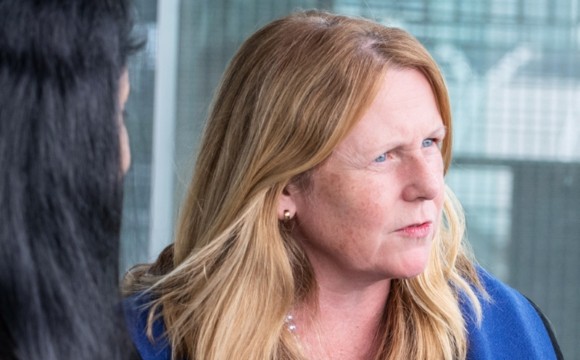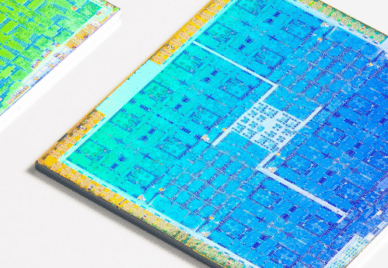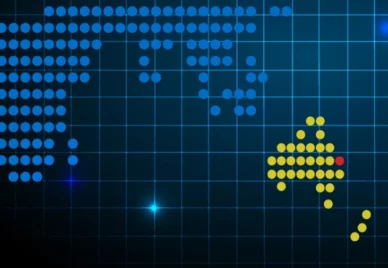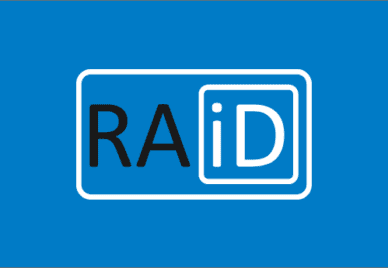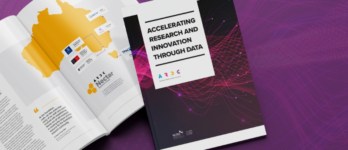
Our CEO, Rosie Hicks, introduces our 2022 impact booklet, Accelerating Research and Innovation Through Data.
In early 2022 we welcomed the release of the Australian Government’s 2021 National Research Infrastructure Roadmap, which committed $900 million over the period 2023–2028 for the tools, technology and skills to keep Australian research internationally competitive.
The roadmap reinforces the critical nature of data – for decision making, for commercialisation and for fundamental research. It supports our focus on ensuring Australian researchers are internationally competitive through having access to high-quality data assets, platforms, infrastructure, policies, people and training.
In the government’s upcoming planning process for capital investment to realise the roadmap, we will ensure Australian researchers continue to benefit from world-leading digital research infrastructure and expertise.
Digital Research Infrastructure That Endures
We are now in the third year of the COVID-19 global pandemic. As you will read in the impact case studies in our booklet, digital research infrastructure provided by the ARDC and our fellow NCRIS facilities has helped researchers respond quickly to the pandemic, and continue to support them with vital platforms and computational capacity. The ARDC’s digital research infrastructure is delivering maximum impact for Australia thanks to our long-term investment and our trusted collaboration with the research community.
The ARDC Nectar Research Cloud is celebrating its 10th birthday this year. Its very first users, Professor James McCaw and his team, have provided weekly epidemic assessments and forecasts to the Australian Government for use in managing the response to COVID-19 since the outbreak of the pandemic.
Surveillance and sequencing of SARS-CoV-2 variants is facilitated by the open, international Galaxy platform, which has been supported by the ARDC Nectar Research Cloud since 2012. The platform makes it possible for the global research community to share data and perform fast and reproducible analyses.
These are just 2 recent examples of the impact of vital digital research infrastructure that has been developed over the past decade and continually enhanced thanks to the long-term investment and vision of the ARDC and our partners. Both rely on the open-source flexibility of the ARDC Nectar Research Cloud and our ongoing investment in world-class research infrastructure.
A Thematic Approach to Tackling Australia’s Biggest Challenges
The ARDC is transforming the approach to creating digital research resources. We have embarked on the development of a suite of Thematic Research Data Commons (Thematic RDCs) that scale up digital research infrastructure to meet Australia’s future research needs. We are investing $15.8 million in 2 initial pilot Thematic RDCs, which will be established in the 2022–23 financial year.
Under the new ARDC Thematic Research Data Commons, we will develop national-scale data assets, digital tools and platforms within thematic areas to address Australia’s science and research priorities. Through coordinating research activities across research domains, industries and government within a strategic priority area, we will provide the foundational digital infrastructure to facilitate industry partnerships and research translation.
In May, we launched the engagement process to help define the first Thematic RDC, the ‘People Research Data Commons’, which will develop enduring national-scale data assets, digital tools and platforms that align with Australia’s science and research priority of health. The second Thematic RDC will open for consultation later this year, with a focus on the environment and agriculture.
Co-designed with the research community, our Thematic RDCs will realise our goal of supporting the maximum number of researchers in strategic priority areas of research through a new approach to participation and organisation.
As a hub of expertise, the ARDC is positioned to drive best practice in creating, analysing and retaining high-quality data assets, and sharing this expertise across domains. Our established digital research services – which include Research Data Australia, Research Vocabularies Australia and the Nectar Research Cloud – are the foundational capabilities for Thematic Research Data Commons, alongside existing research platforms and data assets, and new components.
Also this year, we started work on Food Security Data Challenges, which will create digital research infrastructure that promotes food security in Australia. This is our second Translational Research Data Challenge. The first, Bushfire Data Challenges, now has 13 projects underway, developing innovative digital infrastructure solutions to share data to improve Australia’s bushfire resilience, response and recovery. It has over $6 million in co-investment, highlighting the commitment of our partners.
Creating National Data Assets
To accelerate leading-edge research, under our National Data Assets program we are creating 26 national-scale data assets through strategic partnerships with research communities and institutions.
Also this year, our Institutional Underpinnings program will present a framework for managing research data at Australian universities. This will be the culmination of 18 months’ work by over 90 experts from 25 of Australia’s universities to develop a shared approach to managing research data.
Our Health Studies National Data Asset (HeSANDA) program has completed a design phase and is now building national research infrastructure that will enable researchers to securely access and share data from health studies, with an initial focus on clinical trials. This is a partnership between 9 nodes, which cover 72 health research organisations, health service operators and clinical trial networks from across Australia. The program aims to stimulate data-driven research ideas, increase the impact of health research and, ultimately, improve the health and wellbeing of Australians.
New National Agendas
In the past year, we have launched 2 ambitious agendas for national research infrastructure – specifically, digital research skills and research software. These agendas will develop and support the often-hidden skills and resources that Australian researchers need if they are to use and manipulate data to its full potential.
Our National Digital Research Skills Agenda empowers key stakeholder groups with the resources, tools, and pathways to ensure Australia will lead in this critical space.
Our vision for the National Agenda for Research Software is for research software to be recognised as a first-class output of research, alongside publications and research data.
Both agendas aim to ensure that Australian researchers have the digital research skills that are essential in modern research, and that those skills and research outputs are recognised in their own right, are maintained, and continue to be enhanced.
Our Strength Is Our Community
We could not achieve our ambitious goals without our community, who are integral to our success. This past year, due to the pandemic, we have endured everchanging restrictions, and our team and community have shown tremendous resilience, adapting to remote working, home-schooling children and managing the stress of uncertainty.
Yet, we have still managed to provide vital research infrastructure and support research impact on our continuing journey to accelerate the translation of research into real benefits for Australia. Together with our board, our members, our partners and the research community, we’re proud to be creating data assets, digital platforms, and cultural change that position Australia’s researchers for maximum impact and success.
Rosie Hicks
Chief Executive Officer
Australian Research Data Commons
Read the 2022 Impact Booklet, Accelerating Research and Innovation Through Data.
Related News & Events
Related Case Studies


